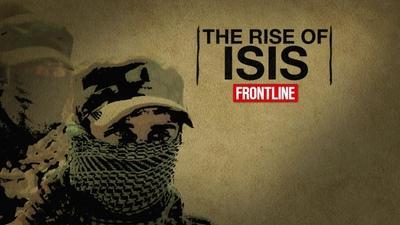Source: PBS.
"Frontline: The Rise of ISIS (Tuesday, PBS, 10 p.m.) gives answers. It’s a must-see background investigation and it lays blame. It doesn’t outright condemn, but the conclusion is easily found – blame is laid at the feet of Nouri al-Maliki, who was prime minister of Iraq from 2006 until 2014, and the Obama administration, which dithered neurotically while al-Maliki created the condition for ISIS to flourish.How did ISIS take Mosul and sweep across western Iraq so quickly this past summer, edging all the way to Baghdad and Erbil in northern Iraq? What are the root causes for its rapid ascension? Any fool can give easy answers. And finding a scapegoat is always the easy thing to do in life, politics, and war.
I’ve watched it twice and concluded that the issue of Islamic State is less about religious fundamentalism than it is about gangsters and testosterone-driven thuggery.
The writer, producer and correspondent is Martin Smith, whose key reports on Iraq – Gangs of Iraq, Private Warriors and Truth, War and Consequences – have been searing. Here he presents a short narrative arc and it is profoundly disturbing. It starts in late 2011, leads us to now and the ending is ominous." - John Doyle, "Frontline: The Rise of ISIS finally gives us some answers" The Globe And Mail, October 27, 2014.
The PBS documentary "The Rise of ISIS" sought out to explain the origins and evolution of ISIS, examining its battlefield prowess in Syria to its social appeal in Iraq's Sunni provinces. The documentary focuses on Maliki's post-US withdrawal policies, political decisions, and military micro-management to explain ISIS's summer of conquests.
Right from the opening shot the documentary takes aim at the easy target in this tragedy, former Iraqi Prime Minister Maliki.
Maliki is a psychologically scarred and politically ambitious individual who abused his powerful position and was too quick to pull the trigger in any confrontation, whether it was with his Gulf-allied political rivals, anti-government demonstrators, tribesmen, basically anyone he did not see eye to eye with.
Maliki is a cowboy, not a statesman. He was a paranoid revolutionary, for good reasons obviously, Saddam was hunting him all his life, but he couldn't make the transition to political power in the post-Saddam era and be the voice of transformative political leadership which Iraq desperately needs. Iraq has enough militias and gangs, it needs political visionaries, and Maliki turned out to be just another glorified gang leader.
But putting the blame entirely on Maliki for ISIS's rise to power is factually wrong. We're talking about a three-year window in Iraq, not ancient history, so it shouldn't be too difficult to collect all the facts.
And what are the facts that PBS decided not to focus on in its documentary?
The first fact is that Sunni leaders in Iraq and beyond have indeed resorted to terror attacks, bombings, and other forms of sabotage to discredit the government in Baghdad. Maliki was not a lunatic dictator gone rogue, and Sunni leaders were not boy scouts. It's easy to label Maliki the evil villain because then the other bad actors would be able to wipe their hands clean of the mess.
The second fact is that foreign powers are more responsible for ISIS's growth than the actions of any Iraqi leader, and this list includes the US, Iran, Saudi Arabia, Turkey, and the Gulf kingdoms. The Saudis and Qataris have pumped money into ISIS since the war in Syria began, the CIA has been training them to be lethal killers, and Turkey is the staging ground for their entry into Syria. What could Maliki do to stop that? Maliki warned that the war in Syria would destabilize his country sooner or later, but that didn't stop the Saudis, Qataris, and the Turkish government from continuing to support ISIS in Syria.
The third fact is that Iraq lacks a competent and patriotic army that is trusted and respected by all of the people, so ISIS's rise was not a result of Sunni grievances, but of the Iraqi army's inability to face its first real challenge.
The foundations for the ISIS takeover were laid when Saddam's army and the Baathists were put out of work by the Bush administration. And the undermining of Iraq as a state did not end there. Former UN envoy to Syria Lakhdar Brahimi has blamed the troubles and sectarianism in Iraq in part on the Bush administration's divide and rule sectarian policies.
And while the Pentagon was building up a joke of an army, Iran was pouring its time and energy into beefing up Shiite militias who may not be as psychotic and fanatical as ISIS but are nevertheless not nice guys. Each country was pursuing its own agenda at the expense of Iraq's collective well-being and security, and the Sunnis lost out.
Then this victorious army that attaches itself to Sunni history and symbolism comes riding into town to rid this community of the humiliations they have suffered since 2003. And who can blame them for falling prey to these seductive monsters. A foreign power killed their ruler after dragging him out of a hole and a longtime regional enemy is being more assertive in the capital that they believe they have a birthright to rule despite the fact that it is majority Shia. So of course the residents of these Sunni areas would be sympathetic to ISIS.
Maliki's actions contributed to their sense of siege. But there is a lot of blame to go around, and not all of it falls squarely on Maliki's shoulders.
